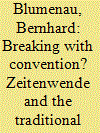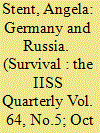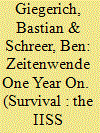|
|
|
Sort Order |
|
|
|
Items / Page
|
|
|
|
|
|
|
| Srl | Item |
| 1 |
ID:
189232


|
|
|
|
|
| Summary/Abstract |
On 27 February 2022, German Chancellor Olaf Scholz addressed the Bundestag and announced a watershed moment (Zeitenwende) for Germany's conduct of foreign affairs. Against the backdrop of the historical pillars of German foreign policy, this article reviews the core implications of the Zeitenwende doctrine. It analyses how the new policy continued or transformed traditional notions underpinning Germany's external relations: Westbindung (integration into the West) and European integration, multilateralism, the pursuit of a rules-based international order and NATO membership, hesitant leadership, Ostpolitik and Wandel durch Handel (transformation through trade), as well as a foreign policy not relying on military means. It argues that Zeitenwende represented a break with some traditional notions, such as Ostpolitik and Wandel durch Handel, and to some extent the non-military foreign policy. However, Zeitenwende also reconfirmed other traditions: Westbindung, a commitment to multilateralism and the rules-based order, as well as the reluctance to assert German leadership. With Zeitenwende, Germany remained firmly committed to the EU and NATO as the country acknowledged that it must do more for its own, and for Europe's, security. Zeitenwende represented Germany's coming to terms with, and final acceptance of, the realities of the post-Cold War European order.
|
|
|
|
|
|
|
|
|
|
|
|
|
|
|
|
| 2 |
ID:
187255


|
|
|
|
|
| Summary/Abstract |
Following Russia’s invasion of Ukraine, German Chancellor Olaf Scholz appeared to jettison 50 years of Ostpolitik by pledging financial and military support for Ukraine, sanctioning Russia and promising to spend more on defence. Seven months into the war, progress on the German Zeitenwende (turning point) is mixed. Germany has sustained far-reaching sanctions and is grappling with weaning itself off Russian energy, but military deliveries to Ukraine have been slow. The German public continues to support Ukraine, but as winter approaches that support could erode, since Russia has tied future gas deliveries to the lifting of sanctions.
|
|
|
|
|
|
|
|
|
|
|
|
|
|
|
|
| 3 |
ID:
192140


|
|
|
|
|
| Summary/Abstract |
In response to Russia’s invasion of Ukraine on 24 February 2022, German Chancellor Olaf Scholz announced a Zeitenwende, or historical turning point, for German foreign and defence policy. Expectations of profound German geopolitical, geostrategic and geo-economic transformation were raised both in Germany and among Berlin’s allies. One year later, Germany’s greatest success has come in the geo-economic arena, where progress has been made to reduce Germany’s energy imports from Russia. Geopolitically, the picture is less convincing. While Scholz has committed to the defence of NATO territory against potential Russian aggression, it is not obvious whether the German government really perceives Russia as a direct threat to the country. Berlin has yet to formulate a convincing geopolitical leadership role in Europe, and it remains to be seen if the new defence minister, Boris Pistorius, will succeed in giving shape to much-needed Bundeswehr reform and resolve major readiness and procurement challenges. Consistent pressure from NATO allies will be needed to help bring about major change to Germany’s strategic and defence policy.
|
|
|
|
|
|
|
|
|
|
|
|
|
|
|
|
|
|
|
|
|